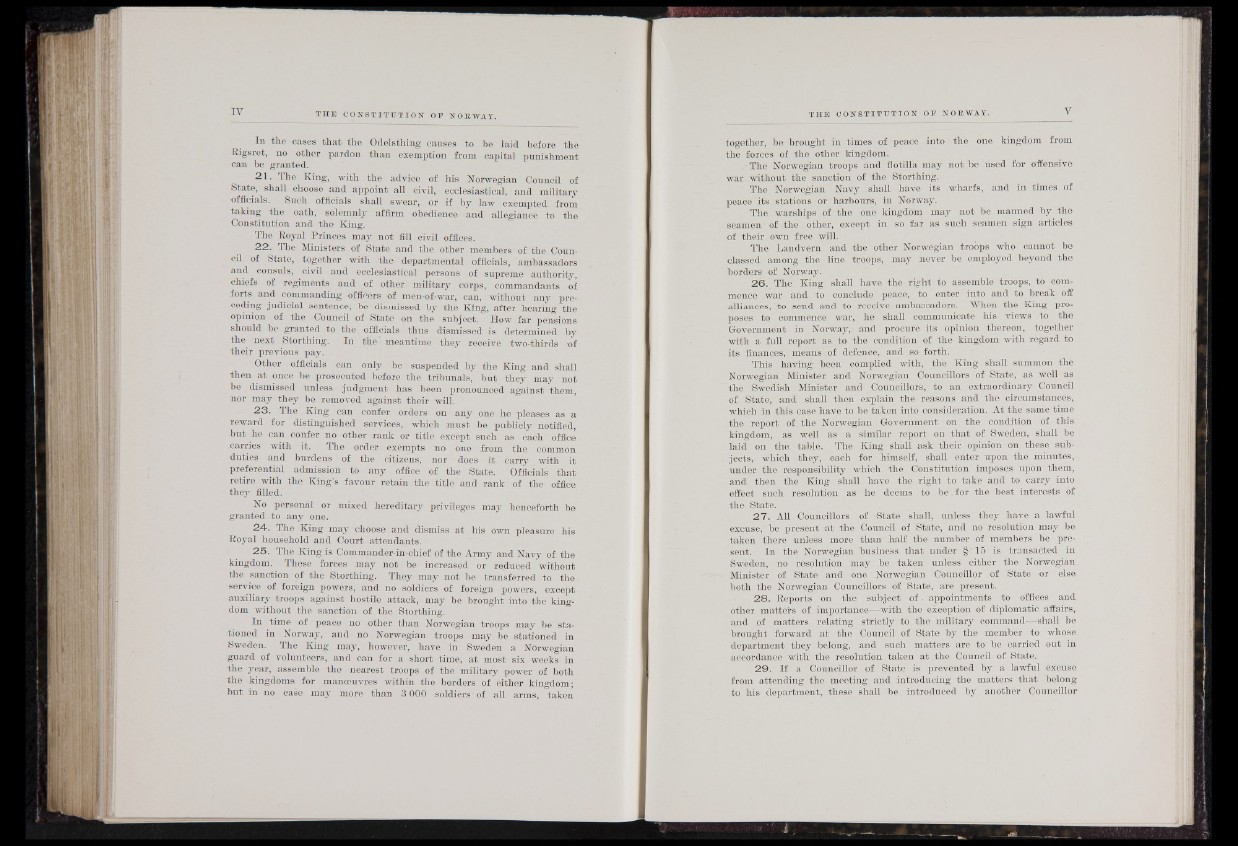
In the cases that the Odelsthing causes to he laid before the
Rigsret, no other pardon than exemption from capitajipunishment
can be granted.
21. The King, with the advice _ of his Norwegian Council of
State, shall choose and appoint all civil, ecclesiastical, and military
officials. Such officials shall swear, or if by law exempted from
taking the oath, solemnly affirm obedience and allegiance to the
Constitution and the King.
The Royal Princes may not fill civil offices.
2 2. The Ministers of State and the other members of the Council
of State, together with the departmental officials, ambassadors
and consuls, civil and ecclesiastical persons of supreme authority,
chiefs of regiments and of other military corps, commandants of
forts and commanding officers of men-of-war, can, without any preceding
judicial sentence, be dismissed by the King, after hearing the
opinion of the Council of State on the subject. How far pensions
should be granted to the officials thus dismissed is determined by
the next Storthing. In the' meantime they receive two-thirds -of-
their previous pay.
Other officials can only be suspended by the King and shall
then at once be prosecuted before the tribunals, but they may not
be dismissed unless judgment has been pronounced against them,
nor may they be removed against their will.
2 3. The King can confer orders on any one he pleases as a
reward for distinguished services, which must be publicly notified,
but he can confer no other rank or title except such as each office
.carries with it. The order exempts no one from the common
duties and burdens of the citizens, nor does it carry with it
preferential admission to any office of the State. Officials that
retire with the King’s favour retain the title and rank, of the office
they filled.
No personal or mixed hereditary privileges may henceforth be
granted to any one.
24. The King may choose and dismiss at his own pleasure his
Royal household and Court attendants.
25. The King is Commander-in-chief of the Army and Navy of the
kingdom. These forces may not be increased or reduced without
the sanction of the Storthing. They may not be transferred to the
■service of foreign powers, and no soldiers of foreign powers, except
auxiliary troops against hostile attack, may be brought into the kingdom
without the sanction of the Storthing.
In time of peace no other than Norwegian troops may be stationed
in Norway, and no Norwegian troops may be stationed in
Sweden. The King may, however, have in Sweden a Norwegian
guard of volunteers, and can for a short time, at most six weeks in
the year, assemble the nearest troops of the military power of both
the kingdoms for manoeuvres within the borders of either kingdom;
but in no case may more than 3 000 soldiers ■ of all arms, taken
together, be brought in times of peace into the one kingdom from
the forces of the other kingdom.
The Norwegian troops and flotilla may not be used for offensive
war without the sanction of the Storthing.
The Norwegian Navy shall have its wharfs, and in times of
peace its stations or harbours, in Norway.
The warships of the one kingdom may not be manned by the
seamen of the other, except in so far as such seamen sign articles
of their own free will.
The Landvern and the other Norwegian troops who cannot be
classed among the line troops, may never be employed beyond the
borders of Norway.
26. The King shall have the right to assemble troops, to commence
war and to conclude' peace, to enter into and to break off
alliances,' to send and to receive ambassadors. When the King proposes
to commence war, he shall communicate his views to the
Government in Norway, and procure its opinion thereon, together
' with a; full report as to the condition of the kingdom with regard to
its finances, means of defence, and so forth.
This having been complied with, the King shall summon the
Norwegian Minister and Norwegian Councillors of State, as well as
the Swedish Minister and Councillors, to an extraordinary Council
of State, and shall then explain the reasons and the circumstances,
which in this case have to be taken into consideration. At the same time
the report of the Norwegian Government on the condition of this
kingdom, as well as a similar report on that of Sweden, shall be
laid on the. table. The King shall ask their opinion on these subjects,
which they, each for himself, shall enter upon the minutes,-
under the responsibility which the Constitution imposes upon them,
and then the King shall have .the right to take and to carry into
effect such resolution as he deems to,. be. for the best interests of
the State.
27. AH Councillors of State shall, unless they have a lawful
excuse, be present at the Council of State, and no resolution may be
taken there unless more than half the number of members be present.
In the Norwegian business that under §"15 is transacted in
Sweden, no resolution may be taken unless either the Norwegian
Minister of State and one Norwegian Councillor of State or else
both the Norwegian Councillors of State, are present.
28. Reports, on the subject of . appointments to offices and
other matters of importance—with the exception of diplomatic affairs,
and of matters relating strictly to the military command-^shall be
brought forward at the Council of State by the member to whose
department they belong, and such matters are to be carried out in
accordance with the resolution taken at the Council of State.
29. If a Councillor of State is prevented by a lawful excuse
from attending the meeting and introducing the matters that belong
to his department, these shall be introduced by another Councillor